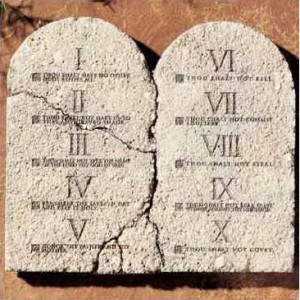Growing up in a Christian home was a benefit, despite my not appreciating it at the time. My conservative parents wouldn’t let my siblings and I go to the movies (“an immoral industry”) or use playing cards (“tools of gamblers”) or dance (“worldly nonsense”). Our music choices were closely monitored, and as for no smoking and drinking? They didn’t even rate an explanation.
By today’s standards my brother, sister, and I were forced to live a narrow, regimented lifestyle. Of course we eventually tested what life was like apart from that parental list of no-no’s and in the end landed a bit short of them. But the older I get, the more I see that high standards are better than low ones.
Mom and Dad believed in scriptural principles. Although they understood the Bible’s concept of living under grace rather than law, they also touted the 10 commandments as a wise, healthy way to live. The two generalized “new” commandments given by Jesus in the New Testament were fleshed out, they said, in the Old Testament’s one-through-ten.
Most people balk at that list of laws or, for that matter, at any rules. The minute we’re told what we can’t do, we want to do it. Of course the root problem is that we all want to direct our own destinies, because it goes against us to take orders from anyone else. We say, “It’s my life, and I’ll live it any way I want.”
Sometimes I think God sets forth a list of should’s and shouldn’ts as a test. He says, “I know this makes you bristle, but because it’s Me asking you, will you trust that it’ll turn out best if you just do it?” We suck air between our teeth and wince, wanting to make him happy but hoping we can do it without having to fully comply.
It helps us to know Jesus never told his followers, “You’d better… or else!”
He left it up to them. Sometimes, after he had delivered the goods, people would turn on their heels and walk away. Although Jesus didn’t try to stop them, we can see disappointment tucked between the lines of Scripture. It wasn’t that he needed their loyalty or devotion. Divinity doesn’t need anything. It was that he felt sadness for them. Rejecting his message meant embracing a much less satisfying life, not to mention what might happen in the next world.
I’m fairly sure my parents were motivated by much the same kind of thinking God had as they studied his rules and then came up with their own. They were doing their best to set their children on a path toward wise, fulfilling futures. Though we struggled to break free of their restrictions at the time, we had to admit the intentions behind the rules were laced with love, the rules initiated by Mom and Dad…
…and the ones initiated by God.
“The trouble is not with the law, for it is spiritual and good. The trouble is with me.” (Romans 7:14)






